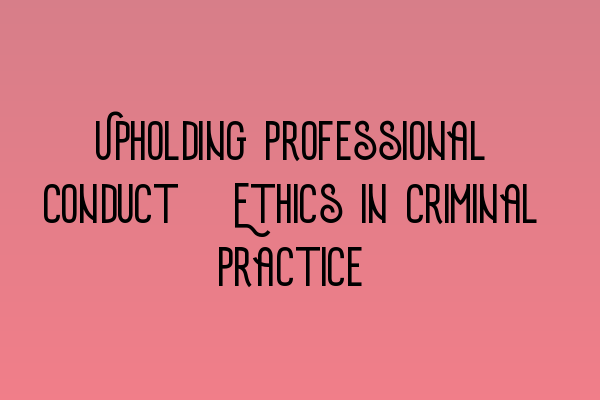Upholding Professional Conduct: Ethics in Criminal Practice
As criminal law solicitors, it is our duty to not only represent our clients to the best of our abilities but also to uphold ethical standards in our practice. Professional conduct plays a crucial role in ensuring justice is served and maintaining the integrity of the legal profession. In this blog post, we will delve into the importance of ethics in criminal practice and its impact on both our clients and the legal system.
The Fundamental Values of Professional Conduct
Professional conduct in criminal practice is guided by a set of fundamental values that dictate our ethical responsibilities. These values include:
- Integrity: Acting with honesty, sincerity, and trustworthiness in all our dealings.
- Confidentiality: Respecting the confidentiality of our clients and safeguarding their information.
- Impartiality: Providing unbiased advice and representation, regardless of personal beliefs or opinions.
- Competence: Maintaining and developing the necessary skills, knowledge, and expertise to effectively represent our clients.
- Independence: Acting independently, free from any influences that may compromise our professional judgment.
By upholding these values, we can ensure that our clients receive fair and just representation while upholding the principles of justice.
The Impact of Professional Conduct on Clients
Professional conduct has a direct impact on the clients we represent. By adhering to ethical standards, we can provide them with the best possible legal representation and ensure their rights and interests are protected. Clients rely on us to navigate the complexities of the legal system and guide them through the criminal justice process.
Furthermore, maintaining professional conduct enhances our credibility and fosters trust with our clients. When they have confidence in our abilities and integrity, they are more likely to cooperate and disclose essential information that can be crucial to building a strong defense.
Additionally, ethical representation can have long-term implications for our clients beyond the immediate case. By acting in their best interests and advocating for justice, we can help them rebuild their lives, protect their reputation, and even prevent future criminal involvement.
Professional Conduct and the Legal System
Ethics in criminal practice extend beyond individual cases and have far-reaching effects on the legal system as a whole. Upholding professional conduct ensures the fairness and integrity of the criminal justice system.
By adhering to ethical principles, we contribute to a system that is built on trust and respect for the law. This is crucial in maintaining public confidence in the legal profession and the justice system, which ultimately leads to a stronger and more just society.
Professional misconduct, on the other hand, can undermine the credibility of the legal profession and erode public trust. It can have severe consequences, including disciplinary actions, reputational damage, and even the revocation of practicing licenses. Therefore, it is essential for all criminal law professionals to prioritize professional conduct and uphold ethical standards in their practice.
Continuing Professional Development and Ethical Guidance
Continuing professional development (CPD) plays a vital role in ensuring that criminal law practitioners stay up-to-date with changes in legislation, case law, and ethical guidelines. It enables us to enhance our skills, knowledge, and understanding of professional conduct.
There are various CPD courses available, such as the SQE 2 Preparation Courses and the SQE 1 Preparation Courses, that provide comprehensive training on professional ethics and legal practice. These courses equip us with the necessary tools to navigate ethical challenges and ensure we uphold the highest standards of professional conduct.
Additionally, the Solicitors Regulation Authority (SRA) provides ethical guidance and codes of conduct that serve as a framework for ethical practice. Familiarizing ourselves with these guidelines and seeking guidance when faced with ethical dilemmas is essential in maintaining professional conduct.
Conclusion
Upholding professional conduct and ethics in criminal practice is not only our duty but also crucial in ensuring justice is served and maintaining the integrity of the legal profession. By adhering to the fundamental values of integrity, confidentiality, impartiality, competence, and independence, we can provide the best possible representation to our clients while upholding the principles of justice.
Continuing professional development and adherence to ethical guidelines are essential in navigating ethical challenges and staying at the forefront of criminal law practice. By doing so, we contribute to a legal system that is built on trust, fairness, and the pursuit of justice.
For more information on legal practice and guidance, you may find the following resources helpful:
- SQE 1 Practice Exam Questions
- SQE 1 Practice Mocks FLK1 FLK2
- SQE 2 Preparation Courses
- SQE 1 Preparation Courses
- SRA SQE Exam Dates
